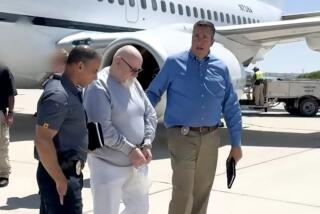Serial Killer Randy Kraft Should Die, O.C. Jury Says : Murderer Linked to 45 Deaths
- Share via
Randy Steven Kraft, a 44-year-old computer expert accused by prosecutors of being perhaps the country’s worst serial killer, was condemned to death today for the gruesome murders of 16 young men in Orange County.
Kraft sat with his hands crossed on the table as he watched each juror affirm his or her vote for the death penalty.
On May 12, six years to the week after Kraft’s arrest, he was convicted of first-degree murder in all 16 deaths presented at the trial in Orange County Superior Court in Santa Ana. The only acquittal was for one count of sodomy because the jurors found that the victim was already dead when the assault occurred.
Authorities have linked Kraft to 45 murders in Southern California, Oregon and Michigan. They say the number could be much greater, however, based on a list Kraft kept in his briefcase with 61 entries. Prosecutors have called the list his score card of victims.
Deputy Dist. Atty. Bryan F. Brown told jurors that Kraft’s arrest was “an end of an era, of Mr. Kraft flying freeways, murdering and dehumanizing people.”
Law enforcement officials say Kraft would pick up hitchhikers, ply them with alcohol and drugs, then overpower them when they were too weak to resist. He would use their own shoelaces to bind their wrists, then strangle many of them with their own belts. He would then dump their bodies along freeway ramps or in remote areas.
Lawyers and judges involved in the case say it could be more than a decade before Kraft’s appeals are exhausted. He faces execution in the gas chamber at San Quentin State Prison.
Expense of Case
Many legal experts say that because of the extensive defense preparations and years of trial delays, this could be one of the most expensive criminal cases ever in the state.
Kraft did not testify at either the guilt or penalty phases of his trial. But in the Orange County Jail, he wrote to friends that he was innocent. He told The Times in a 1983 interview, “I don’t belong here.”
Kraft was arrested at 1 a.m. May 14, 1983, when two California Highway Patrol officers stopped him for weaving on the northbound Interstate 5 in Mission Viejo. They found a 25-year-old dead Marine in the front passenger seat of his car. Kraft said the man was a hitchhiker but offered no explanation for what happened to him.
Within 24 hours, Orange County Sheriff’s Department investigators had linked Kraft to more than a dozen murders, based on evidence found in his car and in his home in Long Beach: pictures of some of the victims in clothes they had worn when last seen, personal belongings of some victims and the list in the briefcase, which had coded entries such as “New Year’s Eve,” “Marine Carson,” “2 in 1 Beach.”
After Kraft’s conviction, his lawyers put on more than 50 character witnesses at his death penalty hearing. They described Kraft as caring, loving and extremely bright. One poignant anecdote came from Carol Barnett, an elderly computer programmer who proudly described herself as one of Kraft’s proteges. It was Kraft, she said, who recognized discrimination against her within the company because of her age. Barnett said he went out of his way to help her learn about computers.
“He didn’t shunt me aside like some of the others,” she told the jurors.
More to Read
Sign up for Essential California
The most important California stories and recommendations in your inbox every morning.
You may occasionally receive promotional content from the Los Angeles Times.












